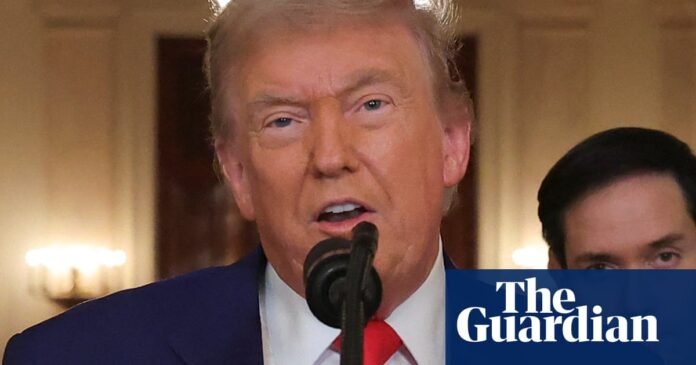Fresh from ordering military strikes on Iran, Donald Trump on Saturday raised the specter of further attacks against Iran if its leadership did not engage in peace talks in a sweeping and at times ominous televised late night address delivered from the White House.
The remarks suggested that the president, who has repeatedly said he wanted to bring peace to global conflicts, at least partly viewed the strikes against Iran’s enrichment facilities as a tactic to force negotiations – just days after he had suggested he would given Iran two weeks before deciding on an attack.
Flanked by his vice-president, JD Vance; the defense secretary, Pete Hegseth; and the secretary of state, Marco Rubio, Trump said from the Cross Hall of the White House that the strikes were aimed at destroying Iran’s ability to enrich uranium to a level where it could be used in nuclear weapons.
“The strikes were a spectacular military success. Iran’s key nuclear enrichment facilities have been completely and totally obliterated. Iran, the bully of the Middle East, must now make peace. If they do not, future attacks will be far greater and a lot easier,” Trump said.
Trump’s address sparked a concerned reaction from some advisers in his orbit who had cautioned against US involvement against Iran because of the potential for the US military to become dragged into a protracted conflict to topple Iran’s leadership as Israel has pushed.
“I’m not sure the talk Maga wanted to hear. It sounded open-ended. They either shut down the nuclear power facility, or give up, or surrender. Very open-ended,” Steve Bannon, the former Trump adviser who had a three-hour lunch with the president on Thursday, said in a special broadcast of his War Room show.
Trump claimed in the speech that the three nuclear facilities in Iran bombed by the US were “completely and totally obliterated”. But the address was short on detail about the bombing operation against three nuclear sites at Natanz and Fordow, the key facility buried deep underground, and at Isfahan, where Iran was believed to have stored supplies of uranium that had been enriched to near-weapons grade.
A US official speaking on the condition of anonymity said the dark-of-night operation involved six B-2 bombers dropping a dozen of the 30,000lb “bunker buster” bombs, formally known as GBU-57s, to try to reach the bottom of the Fordow facility located deep under a mountain.
One B-2 bomber also dropped two GBU-57s on the Natanz facility, in addition to the US navy launching 30 Tomahawk missiles on Natanz and Isfahan, the official said – a strike package far larger than many defense officials had expected.
Aside from his claim of military success, Trump’s remarks were most notable in warning of more attacks if Iran did not start negotiations to end the conflict with Israel and accede to his demands to stop enriching uranium. They also appeared to double as a warning against any retaliation by Iran.
after newsletter promotion
“There will be either peace or there will be tragedy for Iran,” Trump said. “Remember, there are many targets left. Tonight’s was the most difficult of them all, by far, and perhaps the most lethal. But if peace does not come quickly, we will go after those other targets with precision, speed and skill. Most of them can be taken out in a matter of minutes.”
Trump also appeared to offer some justification for the bombing run, making the argument that Iran posed a direct threat to not just Israel but also the US. In doing so, after months of hesitancy, he re-embraced the Israeli prime minister, Benjamin Netanyahu, and said they had worked together as a team.
“For 40 years, Iran has been saying: “Death to America, Death to Israel.” They have been killing our people, blowing off their arms, blowing off their legs, with roadside bombs. In particular, so many were killed by their general Qassem Suleimani. I decided a long time ago that I would not let this happen. It will not continue,” Trump said.





